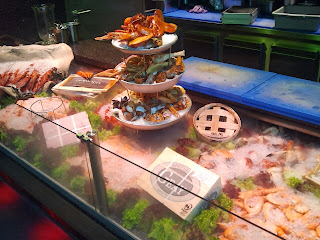 |
| Mmm... Marine biodiversity |
The beam trawl, which used to be by far the most important fishing gear in the Dutch demersal fishery, is disappearing rapidly. Its users were squeezed between high fuel prices, low fish prices, and public outrage at discards and disturbance of the sea bottom. So Dutch cutter fishers are lining up to use the pulse trawl, which combines bottom trawling with tiny electric pulses. The biggest advantage for the fishers is the lower cost of fuel: about 30% of revenues where the beam trawl burns about 55%. Environmental NGOs, notably Greenpeace, are less convinced, but I don't agree with them. Yes, some species like cod and sharks might be affected (the effects are still under investigation) but it sure beats the effect of the traditional beam trawl on shellfish and other benthic life, let alone its use of fossil fuels. As for the taboo on electric fishing: pulse trawling is nowhere near what this guy tried to do.
A number of possibilities were discussed to raise prices. There is an interest in MSC certification, but people are skeptical about the price premium. This is a genuine concern as the price premium for certified fish has so far been disappointing. The main 'advantage' of certification seems to be that big players in the value chain (restaurant chains, supermarkets) might simply refuse to sell non-certified fish.
Another development is the involvement with fresh fish markets. This fits within a wider trend towards 'local' food (which is usually a bit too much romanticized, me thinks). So far it's very small-scale but I like it. Why is it that the Dutch don't appreciate fresh fish? Johan Baaij, a fisher who is involved in a project called Vers van de Visser (fresh from the fisher), argued that the consumer has no idea where the fish comes from, or who is involved in it. It reminded me about how many people think kibbeling is a fish species.
All in all I got the impression that the fishing sector is more or less where our farmers were, say, 15-20 years ago: financial problems, public unease with bulk production and its impact on the environment, but also a lot of creativity and entrepreneurship, and a readiness to engage with their critics.
Geen opmerkingen:
Een reactie posten